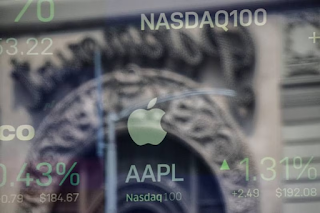Apple's share price rises
Facts
- 🍏 Apple's rising share price re-examines a tough problem for fund managers
- 🍎 Apple's weight in stock indices rises to record highs
- 📈 The impact of Apple stock movements on the performance of indices
- 📉 Investors' fear of overallocation of Apple shares
- ⚖️ The difficulty of outperforming active portfolios if Apple shares continue to rise
- 💼 Reduced allocation of shares affects the performance of mutual funds
- 💰 Some investors hold large positions in Apple shares
Apple's 48% rise in share price this year has increased its weight in stock indices to record highs, forcing some fund managers to reconsider their positions. Because of this heavy weight, Apple's stock movements have a significant impact on the performance of indices. However, many investors have fewer allocations to Apple shares compared to its relative weight in indices.
If Apple shares continue to rise, the performance of active fund managers seeking to outperform indices such as the S&P 500 could be affected. This issue is all the more pressing this year due to a market rally led by a few huge companies such as Apple, Microsoft and Nvidia.
It shows that lower allocations to Apple shares and other stock market winners may negatively impact its performance. There are some investors who hold large positions in Apple stocks, while others fear overallocation of the company's shares. The numbers show that only a few active funds outweigh Apple in the S&P 500.
Some funds are proposing to reduce Apple's stock allocation due to concerns about high valuation, but active managers have to face the risk of delay if the company's shares continue to rise.
Fund managers grapple with insufficient Apple stock holdings amid rising prices
Apple's rising share price presents a challenge for fund managers who find themselves owning less stocks than their significant weight in stock indices. With Apple's market capitalization exceeding $3 trillion and its share price rising almost 48% this year, its impact on the index's performance has reached historic highs. However, many investors hold smaller provisions for Apple due to concerns about portfolio flexibility, concentration risk, and fund restrictions. If Apple's rise continues, active fund managers striving to outperform benchmark indices could face unfavorable consequences.
Apple's dominance in indexes:
Apple gained a 7.6 percent weight in the S&P 500, surpassing any other stock in the index's benchmark history. Thus, movements in Apple shares have a disproportionate impact on the performance of the index. This situation has become even more urgent this year, with a handful of mega companies, including Apple, Microsoft, and Nvidia, leading market gains outperforming broader market indices.
Challenges facing active fund managers:
For active fund managers, owning a large percentage of a single stock like Apple presents challenges. The concentration hazards associated with such heavy weights within the standards can make it difficult to outperform. Analysis of regulatory filings reveals that only a small percentage of broad US market funds have more weight in Apple than in the S&P 500. This low allocation of Apple and other market winners may have a negative impact on the performance of the fund. As of June 28, only 20 percent of actively managed mutual funds with broad exposure to the U.S. market have outperformed the S&P 500 for a year now.
Restrictions and Risk Management:
Fund managers face restrictions imposed by risk management rules and fund mandates, preventing them from allocating more than a certain percentage to any one stock. These restrictions can lead to lower weight positions in Apple compared to the S&P 500. For example, Greenwood Capital, which manages $1.4 billion in assets, values Apple's stock fundamentals but is constrained by risk management rules that limit individual stock exposure to 5%. Thus, the company is reducing Apple's weight compared to its benchmark, looking for opportunities in other stocks.
High costs to limit Apple's holdings:
The cost of limiting Apple shares can be especially prohibitive for fund managers due to the increased weight of stocks in indices. Apple's weight in the S&P 500 now exceeds the entire consumer goods segment. In the MSCI All-Country Index, Apple's weight by 4.7 percent exceeds that of all British stocks combined. While some investors are satisfied with large positions in the stock, others remain cautious about its valuation, especially given the price-to-earnings futures ratio and analysts' price targets.
Conclusion:
Fund managers find themselves grappling with the challenge of insufficient Apple stock holdings as the company's share price continues to rise. Despite the stock's significant weight in indices, many investors hold smaller provisions for Apple due to various factors.
Active fund managers face obstacles in outperforming benchmark indices, and restrictions on individual stock exposure can hinder their ability to benefit from Apple's success.
While some investors are comfortable with large holdings, others are cautious due to valuation concerns. The impact of Apple's continued superior performance on fund managers' performance remains to be seen.

